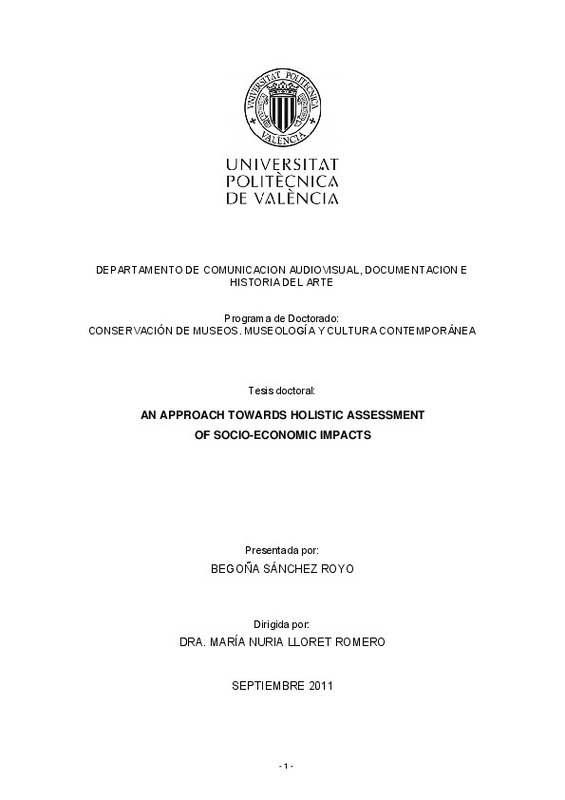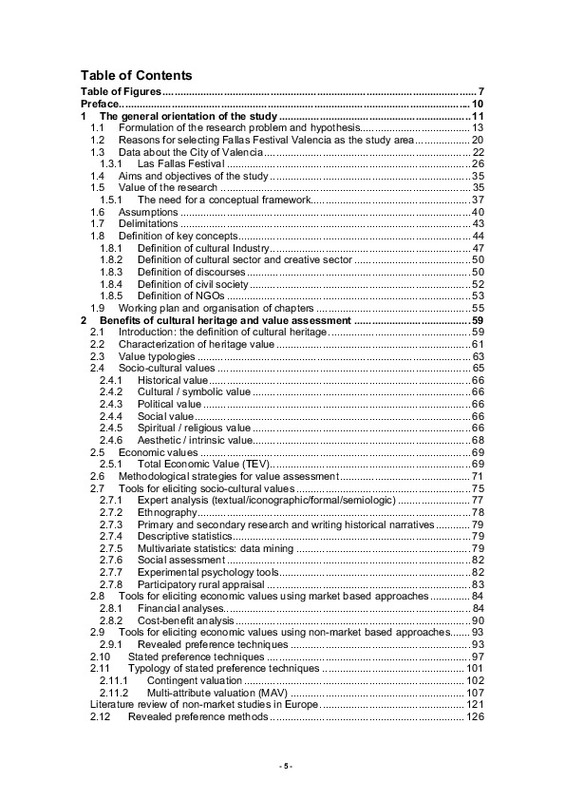- RiuNet repositorio UPV
- :
- Investigación
- :
- Tesis doctorales
- :
- Ver ítem
JavaScript is disabled for your browser. Some features of this site may not work without it.
Buscar en RiuNet
Listar
Mi cuenta
Estadísticas
Ayuda RiuNet
Admin. UPV
AN APPROACH TOWARDS HOLISTIC ASSESSMENT OF SOCIO-ECONOMIC IMPACTS
Mostrar el registro sencillo del ítem
Ficheros en el ítem
| dc.contributor.advisor | Lloret Romero, María Nuria
|
es_ES |
| dc.contributor.author | Sánchez Royo, Begoña
|
es_ES |
| dc.date.accessioned | 2011-10-21T09:19:03Z | |
| dc.date.available | 2011-10-21T09:19:03Z | |
| dc.date.created | 2011-10-14T08:00:00Z | es_ES |
| dc.date.issued | 2011-10-21T09:18:59Z | es_ES |
| dc.identifier.uri | http://hdl.handle.net/10251/12269 | |
| dc.description.abstract | This thesis uses the case study of the Fallas festival in the city of Valencia (Spain), to assess the value of intangible cultural heritage. Within this framework the thesis explores a number of different issues: for example how social agents frame different qualities and benefits of cultural heritage in order to describe the value and claims for funding the arts. It finds that value assessment for claiming funds presents many challenges such as: identifying the values of the heritage in question; describing them; and ranking them according to their contribution to the public welfare. It examines the methodological techniques for assessing heritage values and goes on to discuss a number of tools that are, or could be, used for assessment. The thesis also explores how public bodies legitimise cultural funding. It examines the role of non-government arts organisations in supporting the arts. It proposes the analysis of donor decisions through a multi-attribute technique where donors state their importance to donor situations under specific conditions or attributes. Finally, it describes how the stakeholder approach can be applied for searching new ways of funding festivals. It also considers how intangible cultural heritage goods can be assessed within the process of cost-benefit evaluation. It also analyses how public bodies, as the principal supporters of culture, deal with the problem of valuing intangibles on social investments. The study uses the Fallas festival to test the research hypothesis. It uses a number of economic and statistical techniques to evaluate the Fallas Festival, these include Contingent Valuation, Choice Experiment and Descriptive and Multiatribute Statistics. The statistical techniques reveal that historical benefits are intrinsically valuable in the Fallas festival. The historical value that the members of the neighbourhood associations place on the Fallas festival justify that local social agents should support this festival. | es_ES |
| dc.language | Inglés | es_ES |
| dc.publisher | Universitat Politècnica de València | es_ES |
| dc.rights | Reserva de todos los derechos | es_ES |
| dc.source | Riunet | es_ES |
| dc.subject | Intangible cultural heritage | es_ES |
| dc.subject | Stated preferences techniques | es_ES |
| dc.subject | Multivariate statistics | es_ES |
| dc.subject | Contingent valuation | es_ES |
| dc.subject | Choice experiment | es_ES |
| dc.subject | Intrinsic values | es_ES |
| dc.subject | Cultural sustainability | es_ES |
| dc.subject | Funding culture | es_ES |
| dc.subject | Cultural governance | es_ES |
| dc.subject | Social discourses | es_ES |
| dc.subject | Instrumental and non-instrumental values | es_ES |
| dc.subject.classification | BIBLIOTECONOMIA Y DOCUMENTACION | es_ES |
| dc.title | AN APPROACH TOWARDS HOLISTIC ASSESSMENT OF SOCIO-ECONOMIC IMPACTS | |
| dc.type | Tesis doctoral | es_ES |
| dc.identifier.doi | 10.4995/Thesis/10251/12269 | es_ES |
| dc.rights.accessRights | Abierto | es_ES |
| dc.contributor.affiliation | Universitat Politècnica de València. Departamento de Comunicación Audiovisual, Documentación e Historia del Arte - Departament de Comunicació Audiovisual, Documentació i Història de l'Art | es_ES |
| dc.description.bibliographicCitation | Sánchez Royo, B. (2011). AN APPROACH TOWARDS HOLISTIC ASSESSMENT OF SOCIO-ECONOMIC IMPACTS [Tesis doctoral no publicada]. Universitat Politècnica de València. https://doi.org/10.4995/Thesis/10251/12269 | es_ES |
| dc.description.accrualMethod | Palancia | es_ES |
| dc.type.version | info:eu-repo/semantics/acceptedVersion | es_ES |
| dc.relation.tesis | 3670 | es_ES |
Este ítem aparece en la(s) siguiente(s) colección(ones)
-
Tesis doctorales [5208]







![Text file [Text]](/themes/UPV/images/text.png)


